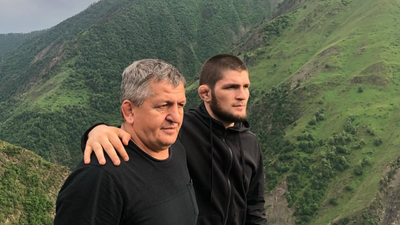Abdulmanap Nurmagomedov: The Architect Behind Khabib’s Dominance

Abdulmanap Nurmagomedov, born on December 10, 1962, is more than just the father of retired UFC champion Khabib Nurmagomedov; he is a monumental figure in the world of mixed martial arts (MMA). His disciplined approach to training and profound understanding of grappling solidified his legacy as one of the greatest coaches in combat sports history.
Early Life and Athletic Foundations
Hailing from the remote village of Sildi in Dagestan, then part of the Soviet Union, Abdulmanap grew up surrounded by rigorous physical culture. Immersed in freestyle wrestling, judo, and sambo during his formative years, he not only developed his athletic prowess but also laid the groundwork for future fighters. His early dedication to these disciplines marked him as a versatile athlete, capable of understanding the intricacies of grappling and striking.
After achieving the prestigious title of Master of Sports in freestyle wrestling, Abdulmanap served in the Soviet military. This experience introduced him to judo and sambo, further enriching his skill set. His return to Dagestan was not just a homecoming; it signified the beginning of his mission to cultivate a new generation of fighters capable of dominating the mat and ring.
Transitioning from Athlete to Coach
Abdulmanap’s coaching journey began in earnest after witnessing his younger brother secure a World Sambo Championship title in 1992. This success was a pivotal moment that not only validated his coaching philosophy but also established what became known as the “Manapov School.” Known for producing numerous combat sambo world champions, this unique coaching approach emphasized discipline, mental toughness, and technical prowess.
His legacy in Russia’s fight culture cannot be overstated. Recognized in the Russian Book of Records, Abdulmanap coached an astounding number of champions, instilling in his athletes values that extended beyond physical training. His fighters were not just formidable opponents; they embodied respect, humility, and national pride. These attributes became synonymous with Dagestani athletes as they made their mark on the global MMA landscape.
Khabib Nurmagomedov: A Son’s Journey
Abdulmanap’s commitment to shaping his son Khabib’s career is emblematic of his coaching philosophy. From a young age, Khabib was not just a son but a protégé. Abdulmanap meticulously guided him through every aspect of training—from developing a structured diet to fostering a competitive mindset. Under his father’s tutelage, Khabib achieved an unprecedented undefeated record of 29-0 in the UFC lightweight division.
Khabib’s grappling style is a direct reflection of the techniques and strategies imparted by his father. Known for his suffocating takedowns and relentless pace, Khabib became a symbol of Abdulmanap’s coaching excellence. But the influence extended beyond just Khabib; Abdulmanap imparted his wisdom to a cadre of fighters, including current UFC lightweight champion Islam Makhachev, who continue to dominate their divisions.
Coaching Philosophy and Impact
Abdulmanap’s coaching philosophy was grounded in the fundamentals of wrestling and grappling. He emphasized the importance of maintaining a strong wrestling stance, mastering takedown chains, and executing relentless pressure as pivotal elements of any fighter’s development. His training regimens focused on physical endurance, mental resilience, and tactical acumen—equipping fighters to not only overpower their opponents but to outlast them mentally.
The impact of his methodologies is evident in the way Dagestani fighters approach competition. They are known for their exceptional control, composure under pressure, and the ability to maintain a relentless pace throughout bouts. This distinct fighting style, characterized by superior grappling techniques, has placed Dagestan firmly on the map in the realm of MMA.
The Legacy of Abdulmanap Nurmagomedov
Tragically, Abdulmanap passed away in July 2020 due to complications related to COVID-19 and a pre-existing heart condition, leaving an indelible mark on the sport and those he mentored. His death resonated deeply within the MMA community as fighters, fans, and pundits recognized the magnitude of his contribution.
Despite his passing, Abdulmanap’s influence continues to thrive. The discipline, respect, and technical brilliance he cultivated are embedded in a new generation of champions. Fighters trained under him carry forward his teachings, ensuring that the legacy of Abdulmanap Nurmagomedov will endure for years to come. His life’s work not only shaped champions but also reinforced the significance of culture, tradition, and mental fortitude in combat sports.
